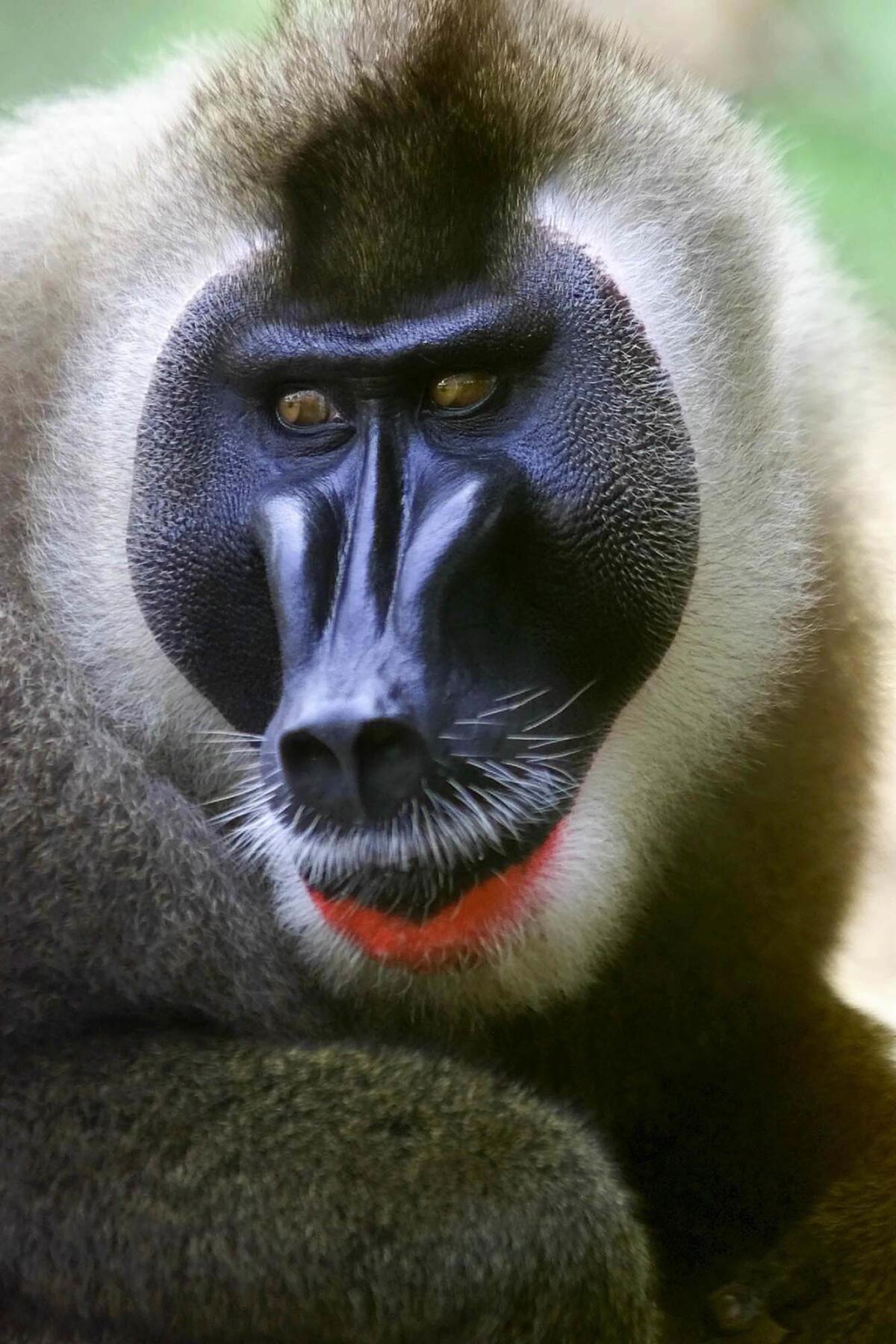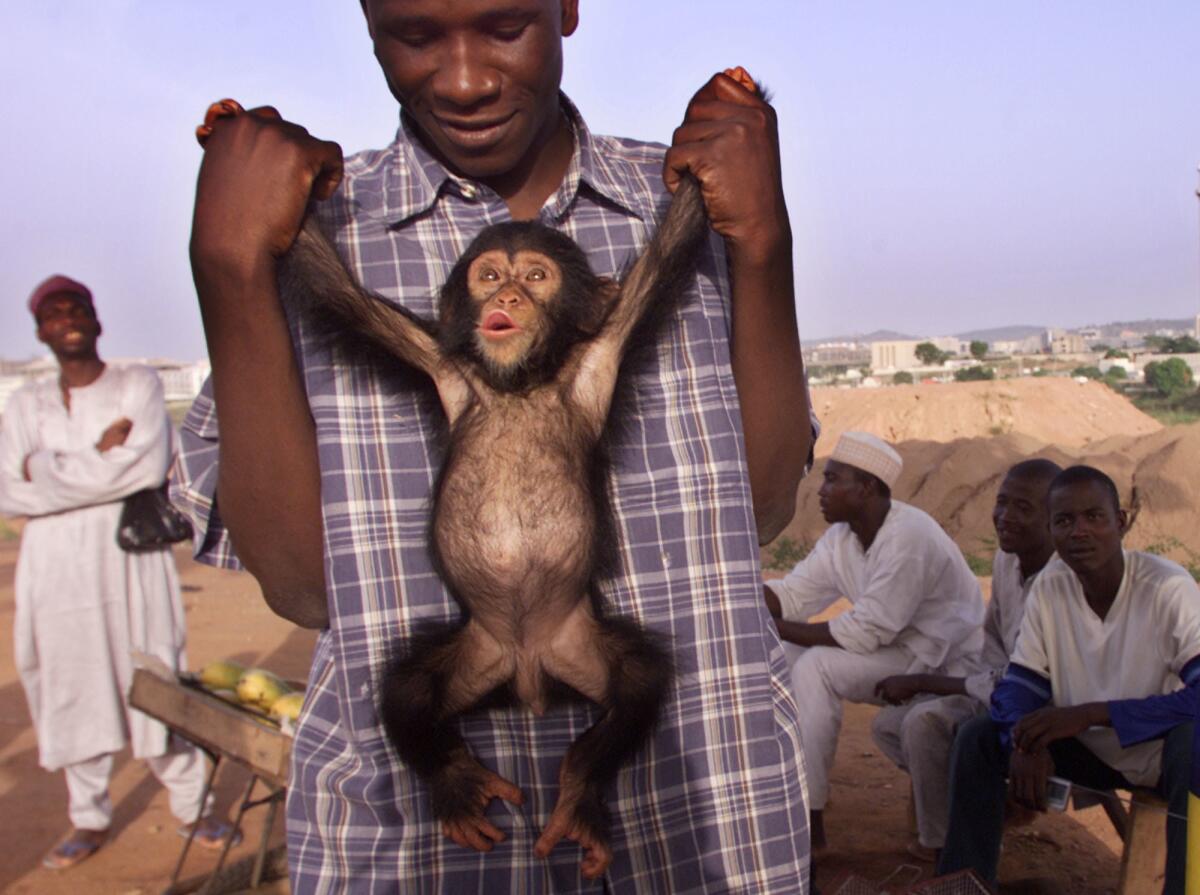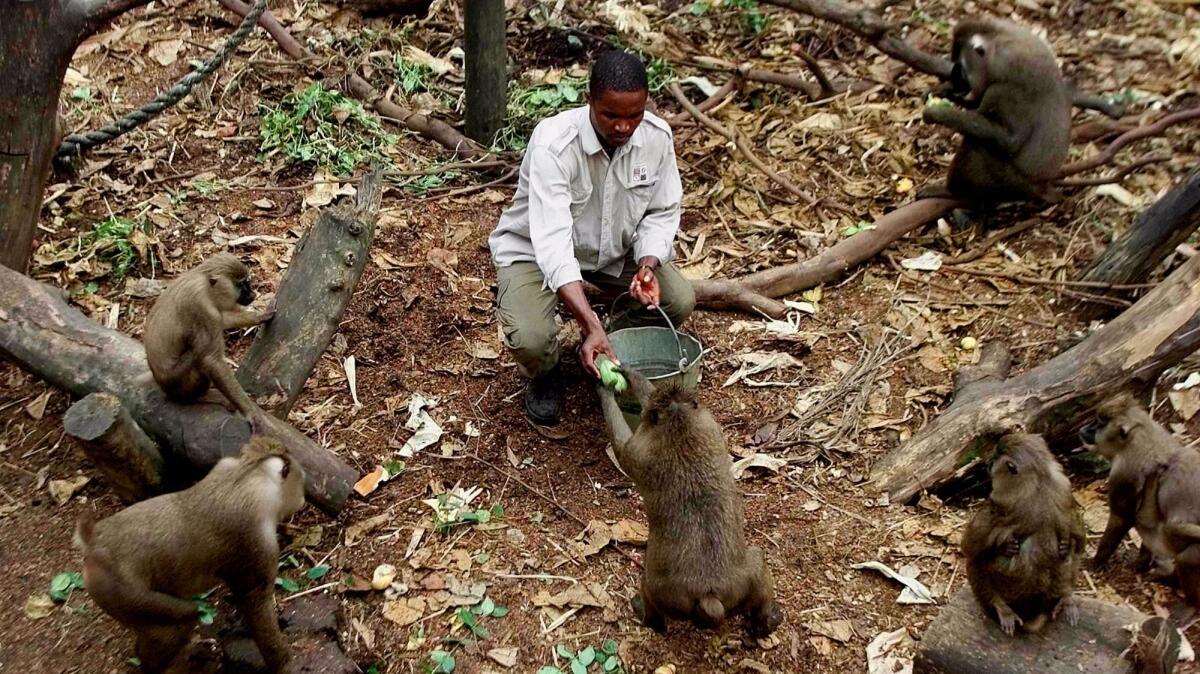Nigeria is planning a six-lane ‘superhighway’ through a remote rainforest. Environmentalists are not happy
- Share via
Pressure is mounting to stop construction of a proposed six-lane highway through a Nigerian rainforest that is home to hundreds of thousands of people and vulnerable wildlife.
The road, locally referred to as a superhighway, is planned in southeastern Nigeria’s Cross River state and would be 162 miles long with six miles of cleared land on either side.
Conservationists say the construction would displace at least 180 indigenous communities and slice through a national park and adjoining forest reserves that provide habitats for some of the country’s most beleaguered species, including the endangered Cross River gorilla, chimpanzees, forest elephants and pangolins — the world’s most poached mammal, whose scales are prized in traditional medicine.
The project pits advocates for environmental and cultural habitat preservation against those who believe the region could benefit from much-needed infrastructure improvement, and spotlights the often contentious global development issue of conservation versus growth.
The so-called Cross River Superhighway, the brainchild of the state’s governor, Ben Ayade, would stretch from northern Nigeria to a proposed deep seaport in the south, on the shores of the Atlantic Ocean. It is expected to include modern facilities such as Wi-Fi, according to information from the governor’s office published in the Nigerian press.
Nigerian President Muhammadu Buhari gave the project the green light more than a year ago, praising it as a significant milestone toward transforming the economic agenda of the state, according to local media.
Conservationists fight back
But conservationists and many local communities are mobilizing against the highway, which they say would have a devastating effect on the rainforest habitat of animals, and the thousands of people who risk being displaced.
As now planned, the road would cut through several protected areas such as the Cross River National Park, Ukpon River Forest Reserve, Cross River South Forest Reserve, Afi River Forest Reserve and Afi Mountain Wildlife Sanctuary. These sites are home to various threatened species, including Nigeria-Cameroon chimpanzees, drills, Preuss’s red colobus monkeys, slender-snouted crocodiles and African gray parrots, among many others.
Survival of the world’s rarest great ape, the Cross River gorilla, which numbers fewer than 300, is also at risk if its habitat is disrupted and impaired, wildlife officials said.

“It is very troubling and worrisome for us that the great work that Nigeria has done to create these areas and protect them could be undermined by this [highway] development,” said John Calvelli, executive vice president of the Wildlife Conservation Society’s public affairs division.
Seeking to persuade Nigerian authorities to halt the project, reroute it away from protected areas and community forests along the border area with Cameroon, or rehabilitate existing highways, the Wildlife Conservation Society has launched an international campaign. As of Tuesday, it had generated 100,081 petition signatures, according to officials from the organization.
The process of clearing a corridor for the project had begun but was temporarily stopped after protests from local communities and groups including the Ekuri Initiative, a forest stewardship organization run by one of the indigenous communities in the path of the proposed expressway.
A public notice issued by the Cross River state government and published in the local press in January said there would be a 656-foot offset on either side of the center line of the roadway and a further six miles of buffer. The land was being “revoked for overriding public purpose,” the notice said.
Conservationists questioned why the buffer abutting the road needed to be so wide, when the buffer on Nigeria’s federal highways is typically about 165 feet. Nigerian officials have been unclear about the need for such a large swath.
Many of the activists have accused the government of staging a land grab. They have helped initiate an environmental impact assessment and have delivered about 253,000 signatures to the federal government urging President Buhari to protect their ancestral forests, Calvelli said.
“We’re particularly concerned about the communities,” Calvelli said. “Without those communities, we are not going to have good stewards of our natural world.”
There is also concern that the road would provide easy access to wildlife traffickers.
“Building a highway of that size through a natural park will only bring poachers closer to the wildlife,” Calvelli said.

Support for the project
Backers of the project insist that the superhighway would provide a much-needed boost to the region’s infrastructure and economy. They cite the benefits of being able to easily transport goods to and from the proposed seaport, and the jobs the construction project would create, among other advantages.
Ayade, the region’s governor, has rejected suggestions the new highway would significantly harm wildlife, and dubbed opposition to the project “a campaign of lies” concocted by a couple of disgruntled officials, according to Nigerian media.
Despite the public notice to the contrary, the governor has insisted that only a corridor of about 115 feet to 280 feet would be cleared to accommodate the highway. And communities affected by the road would be compensated, he has said.
“All you need to construct a road of this nature is balancing between the development and environment,” the website Cross River Watch quoted Ayade as saying. “Environment does not forbid development. And that is what we teach students in the university, development must come.”

Nigeria’s minister of environment, Amina Mohammed, has also lauded the project as crucial for the development of the state and its people, according to Cross River Watch.
“Everyone here is in agreement that infrastructure is the bedrock [on] which we build sustainable development and this project will touch everybody particularly those at the grass roots,” she said this year, according to the website CD Blog.
The road ahead
Calvelli said he was hopeful that further dialogue between Nigerian authorities and conservationists could lead to a mutually agreeable resolution. On Tuesday, he met with the charge d’affaires of the Nigerian Embassy in Washington, D.C., and delivered a thumb drive containing the more than 100,000 petition signatures opposing construction of the highway under the current plan.
Calvelli said that the tone of the meeting was “positive and cordial” and that the diplomat promised to share the information with Nigerian state and federal officials.
“We are not anti-development,” Calvelli said. “We firmly believe that development done effectively with nature in mind is in the best interest of the long-term growth of the nation.”
For more on global development news, see our Global Development Watch page, and follow me @AMSimmons1 on Twitter
More to Read
Sign up for Essential California
The most important California stories and recommendations in your inbox every morning.
You may occasionally receive promotional content from the Los Angeles Times.











